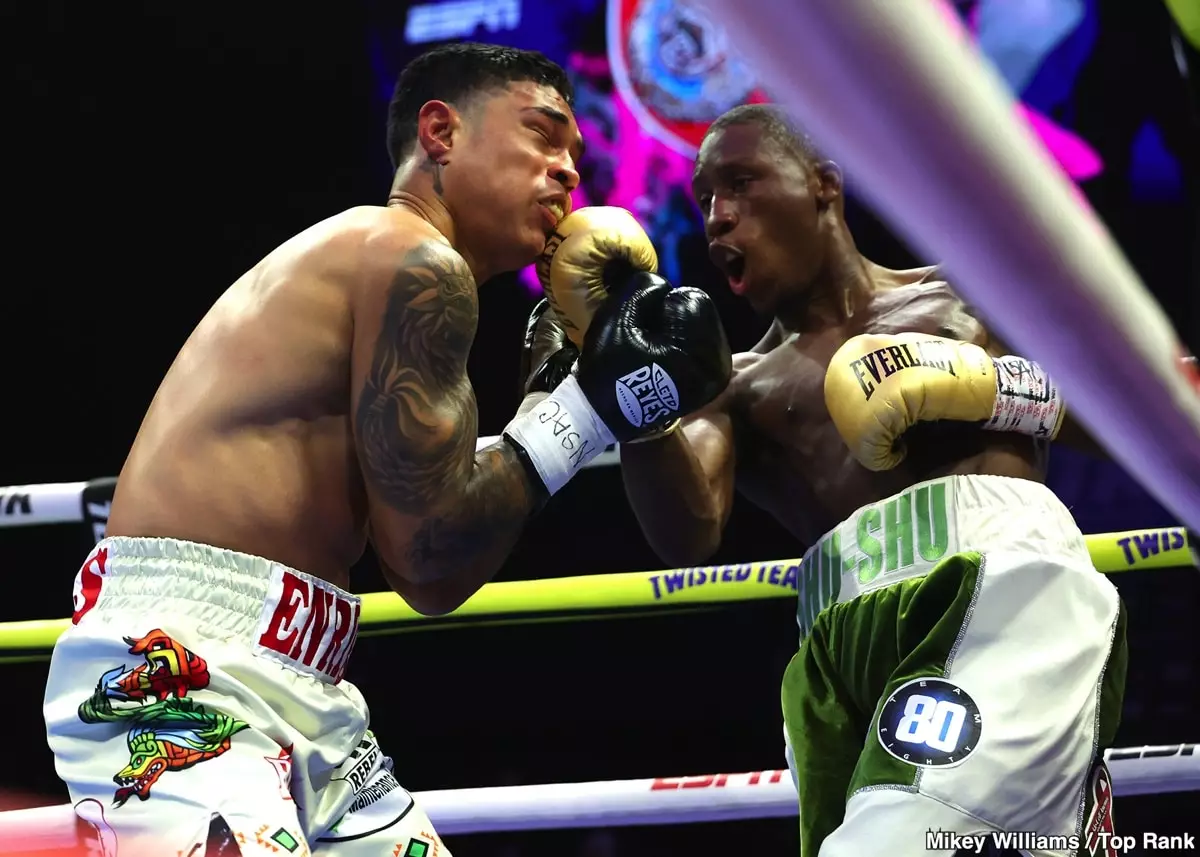In the fast-paced world of boxing, narratives can shift from hero to zero with a single match. Bruce Carrington, currently hailed as a rising star in the featherweight division, has certainly made waves lately. After an impressive knockout victory over Enrique Vivas, Carrington publicly set his sights on established champions including WBC champion Stephen Fulton and WBA titleholder Nick Ball. However, the authenticity of his championship aspirations came into question, notably from Fulton himself, who cast a critical eye on Carrington’s underwhelming resume. In dissecting this unfolding drama, it becomes crucial to evaluate both the fighters and the dynamics at play within the sport itself.
Fulton’s Dismissal: A Champion’s Perspective
Stephen Fulton’s response to Carrington’s bold call-out was far from supportive; instead, it laid bare a central issue in boxing. From Fulton’s viewpoint, Carrington lacks the credible experience needed to warrant a title shot. The champion’s rebuttal highlighted a key point in boxing: mere victories over untested opponents do not qualify a fighter for the highest echelon of the sport. Fulton’s skepticism resonated with many boxing observers, who noted that Carrington’s professional journey has, so far, been carefully curated by promoters at Top Rank. This raises the critical question—what constitutes legitimacy in the sport? Is it merely a collection of wins, or should it also include battles against notable opponents that define a fighter’s caliber?
The Contrasting Fighter Profiles
One cannot overlook the disparity in career trajectories between Carrington and champions like Fulton. At 15-0 with 9 knockouts, Carrington’s record is impressive on paper, yet the lack of formidable opponents questions the integrity of such stats. In contrast, Fulton, who has earned his stripes in the ring, speaks from a place fortified with experience, grit, and a track record that includes defeating tougher competition. Carrington’s recent bout against Vivas showcased his abilities, yet the opponent’s fragility turned the encounter from a test of skill into a potential marketing ploy. Analyzing this further, one may manipulate these narratives into the business side of boxing, where promotional strategies often supersede sporting merit.
The Controversy of Promotion vs. Performance
Carrington’s emphatic claim of being the best in the division raises eyebrows, particularly when juxtaposed with his selective callouts. His decision to bypass Rafael Espinoza signals a strategic avoidance, suggesting a prioritization of financial gain over competitive integrity. Many wonder if Carrington is shielding himself from a potential loss to a taller, seasoned opponent like Espinoza before cashing in on an anticipated title fight against Fulton or Ball. This strategic navigation reveals a prevalent issue in boxing today—the tension between promotion and genuine competition.
Carrington’s assertion that he serves as a role model for aspiring fighters raises the stakes. If he continues to challenge only against lower-tier opponents, does he risk creating a hollow legacy? His insistence that he wants to prove himself seems contradicted by his selective matchups and evasive responses to critiques regarding better opponents.
The Fan Reaction and Industry Implications
Fulton’s candid dismissal of Carrington resonates with fans who crave transparency in boxing. The sport thrives on authenticity—vivid rivalries that involve genuine stakes and confrontations are what fans yearn for. However, Carrington’s carefully chosen path raises questions about whether he is more concerned with maintaining an undefeated record than with solidifying his reputation as a brave and competent fighter.
As the boxing landscape continues to evolve, fans play a pivotal role in shaping fighter narratives. They fuel the market, supporting fighters who engage in meaningful competitions. The potential for Carrington to burnish his credentials by stepping into the ring against fighters like Espinoza could significantly alter public perception, positioning him not just as a promising talent, but as a legitimate contender worthy of championship recognition.
In the end, boxing remains an amalgamation of striking performance and the stories spun around the fighters. The pressure on both Carrington and established champions like Fulton signifies the complex interplay of ambition, legacy, and the raw desire to command respect in the ring. The outcome of this saga will not only define their careers but also reverberate throughout the boxing community, reminding us all that true greatness stems from both skill and the courage to face the best.


Leave a Reply